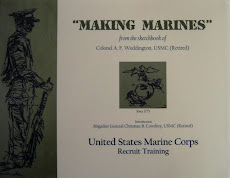By Andy Weddington
Friday, 19 October 2018
A coward is much more exposed to quarrels than a man of spirit. Thomas Jefferson
Never hearing the word much less understanding its meaning, my "ethics" - moral compass - set in youth being raised Roman Catholic and educated in a parochial (one classroom per grade K-8) grade school.
The Ten Commandments clear enough.
Through parish scouting - Cub, Webelos, Boy - came the lessons to navigate land using map and compass, and more importantly to navigate life using map and moral compass.
The 12 traits of a Boy Scout clear enough.
With that background, and understanding ethics, life as a Marine honed (all) navigation skills.
Earlier this week, for several hours over the course of two days, I listened to executives - military and civilian (business, education, philanthropic) - discuss and wrestle with ethics in practice.
The civilians to learn from the military, the primary objective.
What struck me, comparatively, was the absence of a core - values - coming from the civilians.
For in the military leadership principles and traits encompass ethics.
And in the Naval service, of which I am most familiar, core values Honor. Courage. Commitment. guide individual moral behavior and decision-making and the collective. Core values bind.
Too there is that all-important variable of the "spirit" differentiating right and wrong.
In short, those in uniform carry on from a solid common core of ethics.
It's not complicated.
Some with whom I (merely observer during formal discussions) spoke share an interest in fly fishing for trout.
We discussed some finer points as to dry versus wet flies and the sportsmanship of barbless hooks and catch and release.
Yes, there's ethics at play in fly fishing.
Thinking about the discussions of ethics in practice as applied to business, education, or fly fishing, brief analogy came to mind ...
As ethics is largely an intangible only manifested, by consequence, in human behavior, like fly fishing for trout it, (exemplary) ethics, must be cast with great skill. For, in truth, most people, like wily trout, can quickly differentiate between right and sloppy (wrong).
Whether fly dry or wet, trout may be fooled once by sloppy presentation but not twice. And so goes the practice of ethics with (most) people.
When the leader's business end is expertly presented to trout or people, take inevitable. A tight line and a tight business being testament of right. For hook, the state for happy landing set; something tangible in net. Without barb marks a pro, a master.
With ethics, sloppy is wrong. With (the) slack frustrating. Costly, too.
News this morning was more of the same - divisiveness in America; the left's mob strategy and aggressive tactics in resistance to our duly elected President.
Does the average citizen know our (inherit in our Constitution) core values (freedom/liberty, equality, and self-government)?
Does the average citizen have a (early in life) grounding in ethics?
Before I have published commentary about what binds America today.
In short, nothing.
Our big void being lack of a common experience realized from personal sacrifice, shared hardship, teamwork, and accomplishing something not otherwise conquerable.
The struggle with ethics another commentary. A book more like it.
In the meantime ...
Go fish!













2 comments:
Col Andy, as you know, as we have talked about it some, I, too, am a fly fisherman. Learned from Dad at a very early age (8 or 9?), tying came later when I learned patience and perfection. He'd often look at my tied fly, and asked,"What are you going fishing for carp?" As usual, you once again nailed it. The average civilian knows nothinbg of the word ethics, let alone able to practice it in one's daily life. I can assure you, my Young Marines know the word very well; we talk of it often. As a side note, I wonder how or if the new "Scouts" are learning it? Great post Andy. Let's do fly fishing someday at my favorite holes on the East Rosebud River in Roscoe, MT.
I harken back to an excellent book on Leadership, "The Imperfect Leader," by Davis Taylor. His leadership concept is values-based: Integrity, Humility, Courage, Self-Discipline, Compassion, Purpose-Driven, and Gratitude. Sadly, most if not all of said values are sorely missing in our elected "leaders" (using the term ever so loosely)today. And, public secondary and post-secondary schools have completely abandoned any pretense of education in civics, US history, and ethics. Absent a strong values-driven foundation, is it any wonder why our Country is so polarized and intolerant of each other??
Sad, very sad...
Post a Comment